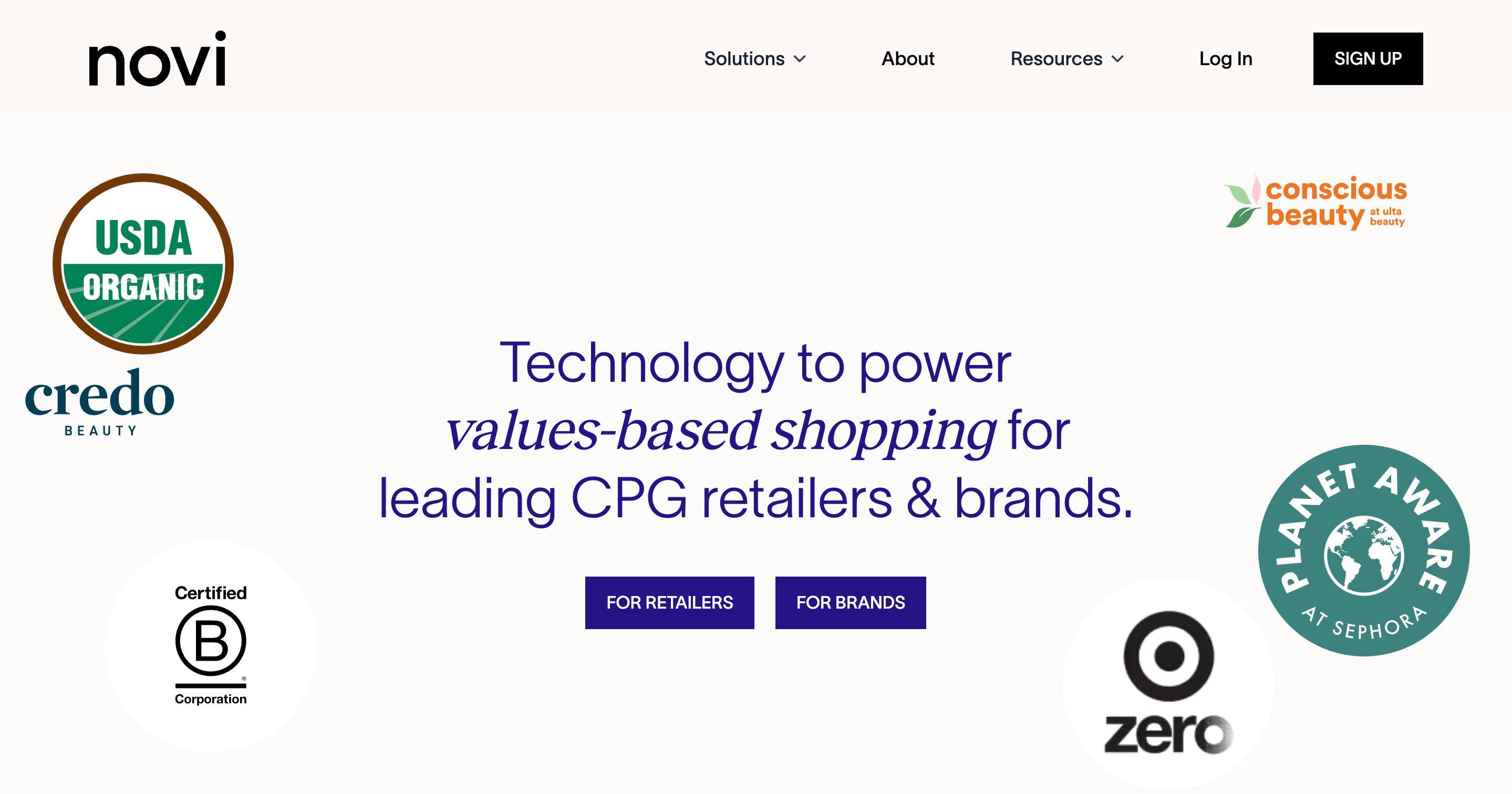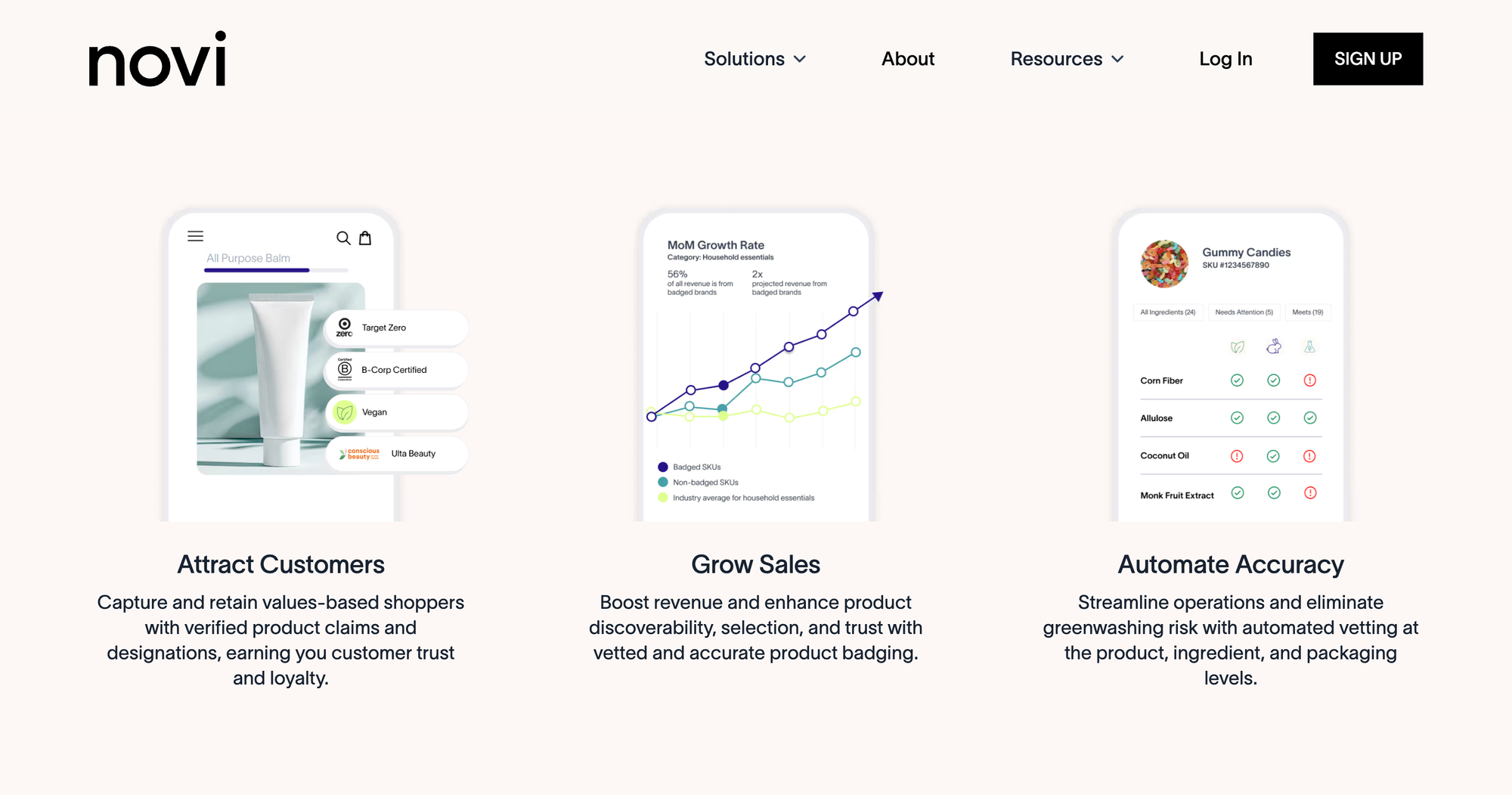In episode 129 of the Disruptors for GOOD podcast, I had the privilege of speaking with Kimberly Shenk, Co-founder and CEO of Novi, about how her company is revolutionizing the sustainable product space.
By connecting brands, manufacturers, and suppliers, Novi is making it easier to launch sustainable products faster and more efficiently.
Listen to more Causeartist podcasts.
Novi’s Mission and Growth
Novi Connect recently secured $40 million in new funding led by Tiger Global, with follow-on investments from Defy.vc and Greylock. This new round of investment comes just six months after Novi’s previous $10.3 million raise, bringing its total funding to over $51 million. The company’s rapid growth reflects the increasing demand for sustainable and transparent consumer products.
Technology is rapidly reshaping industries worldwide, and Novi is at the forefront of leveraging tech to drive sustainability. Kimberly Shenk’s mission is to replace unsustainable products with better alternatives—a vision she embraces in both her personal and professional life.
The Inspiration Behind Novi
Kimberly’s journey into sustainable product development started when she became pregnant and started questioning the chemical ingredients in beauty and personal care products. Her search for safer, more sustainable options ultimately led to the founding of Novi, a platform that facilitates the research, sampling, and sourcing of raw ingredients and packaging.
Novi’s platform leverages vast datasets and artificial intelligence to enhance the formulas and packaging of thousands of beauty and personal care products. By making clean and sustainable materials more accessible, Novi is helping brands create products that are better for both consumers and the planet.
Kimberly Shenk’s Background in Tech and Data Science
Kimberly’s impressive background in data science and technology has played a critical role in shaping Novi. She graduated at the top of her class from the United States Air Force Academy with a double major in Mathematics & Operations Research and later earned a Master’s degree in Operations Research from MIT.
Before founding Novi, she built and led data and product teams at companies like Eventbrite and Domino Data Lab. She also co-founded NakedPoppy, a company focused on using data to bring clean and sustainable products to market.
Her unique expertise in data science and technology has allowed her to build Novi into an innovative and powerful tool for sustainable product development.

How Novi Works: A Platform for Transparency and Efficiency
Novi provides a streamlined digital infrastructure that enables brands, manufacturers, and suppliers to collaborate more effectively. Here’s how different stakeholders benefit from Novi:
For Brands:
- Research: Understanding compliance requirements, certifications, and ingredient standards.
- Discovery: Accessing pre-verified sustainable materials and packaging options.
- Build: Creating formulas and products that meet sustainability goals and regulatory standards.
For Manufacturers:
- Supporting brands in product development by using Novi’s research and sourcing tools.
- Developing compliant, high-quality products faster.
For Suppliers:
- Listing materials on Novi’s platform for brands to discover and purchase.
- Providing essential data to verify sustainability claims and increase visibility in the market.
Addressing Greenwashing Through Data and Transparency
One of the biggest challenges in the sustainability space is distinguishing truly sustainable products from those engaging in greenwashing. Novi solves this issue by digitizing supplier information, making data on ingredients and materials readily accessible.
This allows brands to make informed, data-backed decisions and helps consumers trust the products they purchase.
Lowering Barriers for Entrepreneurs and Small Brands
One of the most exciting aspects of Novi is its potential to democratize product development. Historically, launching a sustainable brand required significant resources and industry knowledge.
Novi lowers these barriers by providing access to sustainable materials, financing options, and better pricing. This enables indie brands and startups to compete with larger corporations and bring innovative, sustainable products to market more efficiently.

Novi’s Business Model and Future Expansion
Novi operates as both a marketplace and SaaS platform, generating revenue through transaction fees and subscriptions. With its latest funding, Novi plans to expand beyond beauty and personal care into other product categories such as household cleaning products and food packaging.
The company is also investing in improving its technology to enhance the user experience for suppliers and manufacturers.
The Future of Sustainable Product Development
Looking ahead, Kimberly envisions Novi becoming the go-to platform for sustainable sourcing across all industries.
As consumer demand for transparency grows, Novi is well-positioned to accelerate sustainable product development and push industries toward greener, more ethical practices.
By equipping brands with the right tools and resources, Novi is paving the way for a future where sustainable, high-quality products are the norm rather than the exception.
Interview Transcript
00:09
Host: Well, thanks so much, Kimberly, for joining me today. I’m super excited to talk to you. You are building one of the most interesting products that I’ve seen in a while for the space that I’ve been in for so long. It’s going to be really powerful as more people learn about it.
But before we get into Novi, tell us a little bit about your journey before you started Novi, and what was the catalyst for the idea?
00:35
Kimberly: Well, thank you, Grant. I’m really excited to be here to chat with you. A little about my journey, which is interesting. My background is in data science and tech. I’ve been doing software development my entire career. I started as a data scientist in the Air Force, served as a captain, and worked on some top-secret projects.
When I was studying data science at MIT, I became fascinated with how it was being leveraged in tech and found my way to Silicon Valley to explore that further. I built the data science organization for a tech company called Eventbrite.
But I’ve always been passionate about health, wellness, the environment, and sustainability. This led me to co-found a company called Naked Poppy, which aimed to leverage data to bring better products to market for consumers.
This was my first exposure to manufacturing and physical product development. I naively thought there would be a lot of data to make this process more calculated. However, I quickly realized that information about materials and their impact on health and the environment was almost non-existent.
I started researching with various brands, learning about their struggles to find better materials and understand the ones they were using.
I saw this as a data problem and began tackling it more holistically, leading to the creation of Novi. It’s a confluence of my background in data, tech, and my passion for health and the environment.
02:42
Host: Over the years, understanding labeling and whether a product is genuinely sustainable or just greenwashing has been difficult for consumers. How do you ensure that consumers can trust the brands and products?
04:12
Kimberly: One interesting finding when we started talking to chemical, packaging, and fragrance suppliers was that they have lots of data and information. However, this information is often housed in white papers and file cabinets, making it inaccessible.
Our technology streamlines this process by working with suppliers to digitize their information, allowing us to better understand the sustainability and health impacts of materials.
This helps brands discover and find better materials more rapidly. Additionally, it provides suppliers with insights into how to market their materials and adjust their R&D roadmaps based on brand demand. Our technology facilitates transparency, enabling faster purchasing decisions, time to market, and more sales for suppliers.
05:48
Host: Let’s go through the pillars of what Novi accomplishes for different stakeholders, starting with brands. What do brands get out of Novi?
06:02
Kimberly: Brands benefit from Novi in three main ways. First, research: understanding their story, ethos, and what it takes to be compliant with different standards and certifications. Second, discovery: finding pre-verified materials that meet those standards.
Brands can search for packaging, glycerin, and other materials that align with their values. Third, build: brands can combine these materials in a digital way, understanding the overall sustainability and health impact of their product. This helps them ensure their product meets various standards like being vegan or compliant with California Prop 65.
07:17
Host: What about manufacturers?
07:19
Kimberly: Manufacturers often support brands in the development process, but they also build products for their various brand clients. They use our platform similarly to understand standards, claims, and source materials, and then use our build software to put it all together.
07:49
Host: And suppliers? How do they use Novi?
08:06
Kimberly: Suppliers list their materials on our platform, allowing brands to compare and choose the best options. Suppliers provide us with data so we can verify their materials against different standards, which helps them get more business.
We drive sales to these suppliers and provide them with visibility into brand demands and ways to be more relevant.
08:42
Host: Coming from a tech background into a space with physical products, what were your first steps in getting the ball rolling with Novi?
09:19
Kimberly: We started by flying out to New Jersey, sitting down with manufacturers, and learning about their processes. We talked to many brands about their product development and sourcing processes.
The industry traditionally operates through trade shows and door-to-door sales, which COVID disrupted, creating a void we were able to fill with our digital solution.
10:28
Host: What I love about Novi is that it will enable many more entrepreneurs. The barrier to entry becomes lower, allowing people to bring their ideas to life more easily. How do you see Novi impacting the entrepreneurial landscape?
11:29
Kimberly: Our mission is to give accessibility to small and upcoming brands. Indie brands and startups are driving change, and consumers want to support them. We enable these creators by offering tools and resources to find better materials, often more affordably. We provide financing, better pricing, and terms, making it easier for new brands to enter the market.
12:34
Host: What is the business model of Novi? Is it a marketplace where you take a small fee from transactions?
12:54
Kimberly: Yes, that’s correct. We take a cut of transactions and also offer a SaaS subscription model for more complex development and design software.
13:13
Host: Can you elaborate on the design side? How does it work for creating a whole product?
13:24
Kimberly: Brands can search for ingredients, drag and drop them into a Formula Builder, and we show if the entire formula meets the desired standards. We provide recommendations and help optimize the formula for the best results, ensuring it meets all necessary standards.
14:18
Host: You recently raised a significant amount of funding. What’s the roadmap for Novi with this new funding?
14:35
Kimberly: We started in personal care and beauty, a large market with thousands of suppliers and brands. The funding allows us to expand rapidly into other categories like household cleaning products and food. We’ll also enhance technology for suppliers, providing them a better platform experience.
15:17
Host: Looking five years down the line, what does success look like for Novi?
15:42
Kimberly: Success means expanding into all product categories. Consumer demand is high for transparency in personal care, and we want to accelerate sustainable product development across all categories, even those lagging behind like building materials.
By giving brands the tools early, we can drive significant change in how products are developed.
17:02
Host: To create significant impact, we need big companies to make shifts too. What have conversations with larger companies been like?
17:20
Kimberly: Larger brands recognize the need to stay relevant and make changes due to consumer demand and board-level ESG standards. They are reformulating existing products and acquiring up-and-coming indie brands.
We support small brands in growing and getting acquired by larger companies, driving change from the bottom up. We also help larger brands rethink their product lines when possible.
18:38
Host: Thank you so much, Kimberly. I think Novi is going to be a game-changer in the industry, moving it forward and meeting consumer expectations. Best of luck in the next decade.
19:18
Kimberly: Thank you so much. I really appreciate it.







